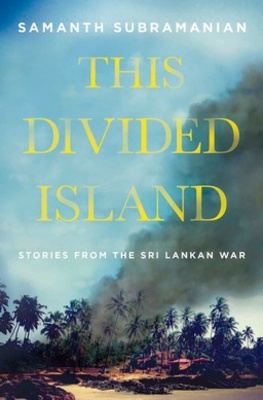
‘The problem with the Tigers was that they fought their war based on language,’ he had said. ‘That was a mistake, because language isn’t a unifying enough force. These struggles are better organized around religion.’
Perhaps, like real currency, rumour even keeps things liquid, because it does not always require you to commit to an opinion or to modify your views. During the war, this must have been a useful quality.
(The Tamil word translates into ‘the problem,’ which always reminded me of the Troubles, the Irish term for their own three decades of conflict.)
In old census reports, I found a hint of how British administrators had vivisected Sri Lanka in the early 20th century. In 1901, when Tamils constituted just over a quarter of the country’s population of three and a half million, the census classified people into seven categories—Europeans; Burghers; Sinhalese; Tamils; Moors, referring to Muslims of south Indian origin; Malays; and the indigenous Veddahs of eastern and south-eastern Sri Lanka. A mere 10 years later, the matrix had exploded. By ethnicity, a Sri Lankan in 1911 could identify himself in any one of 10 ways, and then again in any one of 11 ways by religious denomination—a multiplicative tumult of identity. Slender distinctions were now officially recognized. A Sinhalese could be a low-country Sinhalese or a Kandyan Sinhalese; a Tamil could be a Ceylon Tamil or an Indian Tamil, depending on how recently his family had settled in Sri Lanka; a Christian could be a Roman Catholic, Presbyterian, Wesleyan, Methodist, Baptist, Congregationalist or a Salvationist, or he could belong to the Church of England or ‘Other Sects.’ Assembling legislatures based on such muddled ethnic loyalties helped the British by disrupting solidarity and nationalism because, as Governor William Manning once wrote to his secretary of state in London, ‘no single community can impose its will upon the other communities.’
In the endgame of the war, he said, when a shrunken band of Tigers had been trapped on a sandbar between the Nandikadal Lagoon and the sea, with the immovable might of the Sri Lankan army cutting off their only escape, Prabhakaran handed out CDs of a recent Hollywood movie to his top leaders. The movie was 300, the tale of Leonidas and his pocketful of Spartans fighting to their death against an overwhelming Persian army, as told through cartoonish violence. ‘He had seen the movie six times himself,’ M. said. ‘He used it to prepare himself for the end.’
The Tigers sang the siren song of the tyrant most effectively. What we’re doing is for the greater good of us all. Bear with us through these small excesses, and we will deliver you the promised land. It provided a useful life lesson: anybody who asked you to trust them despite minor infractions was not to be trusted at all.
The king Yasalakatissa, who had come to his title by killing his older brother during a water-sports festival, had a gatekeeper named Subha. Subha was the spitting image of the king, and so Yasalakatissa draped Subha in royal regalia and seated him on the throne. While the courtiers clustered around the impostor and sang his praises, Yasalakatissa, having dressed as a gatekeeper and stationed himself at the door, shook with laughter at the ingenuity of his jape. Then one day Subha addressed the ministers while the king was laughing, ‘Why does this gatekeeper laugh in my presence?’ He had King Yasalakatissa killed. Subha then reigned six years.
One of the most surreal of such displays came from the pronouncements of Jackson Anthony, a television personality who described himself as a veteran historian, and who had once hosted a dull television series consisting only of his commentaries on the Mahavamsa. He had interrogated the past, Anthony said, and he had arrived at the conclusion that Rajapaksa was not only a direct descendant of Dutugemunu but also related by blood to the Buddha himself. Anthony grandly explained his revelations during the season finale of Ranaviru Real Star, an American Idol knock-off that was conceived by the defence secretary Gotabhaya Rajapaksa and produced by his ministry.
I expected her to tell me that love trumped everything, or that it was not, after all, Elilan who pulled the trigger on her sister. These explanations I would have understood, but Ananthy offered neither of them. Instead she reasoned that the armed struggle and the Tamil cause were bigger than Lingeswari’s life, and that she eventually came around to recognizing that. This was the leap of faith that Prabhakaran asked Sri Lanka’s Tamils to take. The Eelam movement will consume many of your nearest and dearest, he told them, but it will all, once the fighting was over, be entirely worth the sacrifice. Clinging to this belief was the only way in which the violence-ridden universe of the Tigers could make any sense.